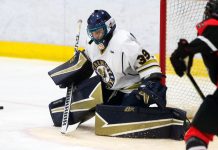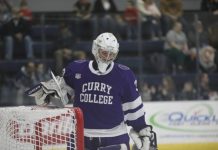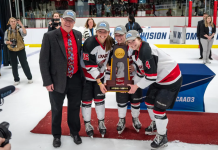New school. Old school.
In either case it’s still in session in the world-wide classroom encased in ice.
As the U.S. hockey community celebrates the 10-year anniversary of striking of the first women’s Olympic gold medal, a select group of 27 of today’s best players have been tabbed to take steps toward repeating the feat in Vancouver two years hence.
Toiling locally, dreaming globally.
USAHockey has just announced its preliminary group of National Team hopefuls, from which this year’s entry in the IIHF Women’s World Championships will be drawn.
Some of them, eight in fact, already have Olympic rings on their luggage tags, while 15 more are currently playing D-I pucks.
And while the immediate focus is on bringing back a WWC title from Harbin, China, it’s another Pacific Rim destination — Vancouver — that each of them has their sights trained on.
That’s certainly true for Kacey Bellamy, a University of New Hampshire junior who is vying for a spot on the Nationals‘ blue line.
Bellamy already has logged tours with the Nats’ Select squad in the last two Four Nations’ Cup tourneys.
But her eyes are fixed on an even more prestigious prize.
“My number-one goal,†she said, “is to go to the Olympics.â€
She began fueling those ambitions from the time she took part in her first Lake Placid USAHockey camp as a 16-year-old. The stoking became more heated after being given the nod to join the 2006 FNC team.
“That was just a great experience,†she said. “Playing with the best female hockey players, both with and against. It was a little overwhelming, but it was a great experience.â€
Overwhelming, and perhaps intimidating too. But as Bellamy found out, the rewards far outweighed the risks.
“It was a big step,†said Bellamy, one of three hockey playing siblings (with brothers Rob and Corey) from Westfield, Mass. “I had to come out of my comfort zone and play with the older girls. The Angela Ruggieros, the Krissy Wendells and the Natalie Darwitz‘s. I was just blown away from listening to them talk, watching their leadership. At the same time, you’re out there practicing and playing with them, and saying ’wow, I can really play at this level.’â€
And if she can play with them there, it stands to reason she can hold her own with the country’s elite when Olympic jobs are on the line.
“You’ve just got to keep working hard,†she said, “to get to the next level. That’s the Olympics, hopefully.â€
Of course, where Bellamy hopes to go, Cammi Granato — the Babe Ruth (or Babe Didrikson, at least) of the sport — has already been. Twice.
Granato, of course, captained that maiden Olympic squad, which had to overcome its historic futility against the Canadians to win the gold.
To her, the rush of the past decade has done nothing to dim her memories or diminish her appreciation for the feat.
“I think it’s great to sit here and reflect on what happened 10 years ago,†said Granato, during a media conference call that included your faithful correspondent. “It’s hard to believe that it’s been this long. I think what happens, though, as the years go by, is that you really start to appreciate that we were the first. The first women in the Olympics in ice hockey. We were the pioneers in that regard. There were plenty of players who came along, who didn’t get that opportunity. But the fact that we were lucky enough to be there, was incredibly special.â€
Of course by that time, Granato had already accomplished all that one could do in women’s hockey.
Score a zillion goals and lead her Providence College team to ECAC titles.
And of course, as Bellamy does, Granato had hockey playing brothers (Tony and Don) with accomplishments of their own.
Even so, Granato couldn’t help but be taken aback when she first hit Nagano.
“It was all new,†she said. “Every single person shared that excitement. Whether it was going to the Village and going to the cafeteria, seeing the other athletes. Getting our apparel. Seeing the locker room and the ice for the first time. Everything was new to everybody. The experience was that much better.â€
Still, to come home from Japan as pioneers was one thing. But to come home as Olympic champions, was, to shamelessly purloin a phrase, priceless.
“What I remember the most,†she said, “was that we hadn’t been able to beat Canada when it counted. Then all of a sudden, we gained momentum. Game after game.â€
Even so, Granato, as articulate a spokesperson for the sport as there is, said she has trouble putting that initial Olympic experience into words.
“Even 10 years past [it],†she said, “it’s still hard to put into words, what that experience meant. It’s still hard to describe just how monumental and special and absolutely amazing that experience was. But we’re trying.â€
Bellamy, then, will just have to find out for herself.


